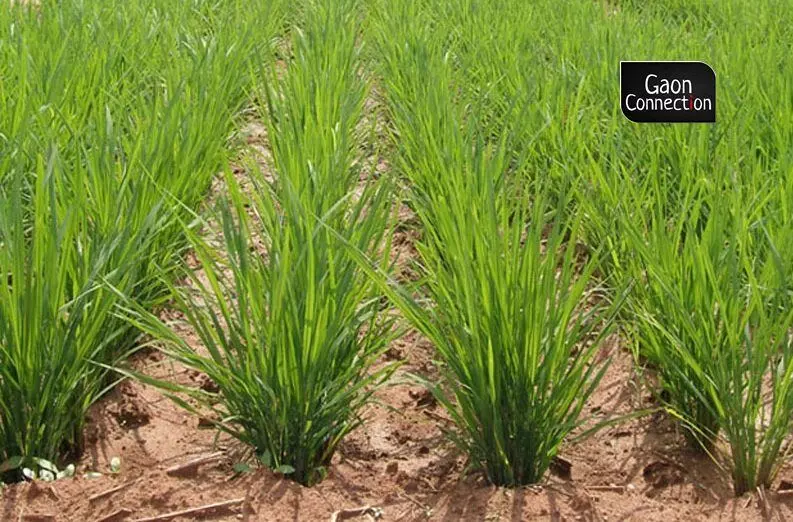World Food Day: Bayer launches a new method of paddy cultivation that will help smallholder farmers in India
Direct Seeded Rice System, in which rice seeds are sown directly into the field as opposed to the traditional method of growing seedlings in a nursery, has the potential to bring down greenhouse gas emissions, use much less water, and reduce dependency on manual labour.
 गाँव कनेक्शन 16 Oct 2023 12:53 PM GMT
गाँव कनेक्शन 16 Oct 2023 12:53 PM GMT

A new method of rice cultivation called Direct Seeded Rice System (DRS), promises several benefits including reduction of greenhouse gas emissions and less use of water, Bayer said in its press statement.
On October 16, United Nations World Food Day, at the 6th International Rice Congress in Manila, Philippines, Bayer, the German multinational pharmaceutical and biotechnology company introduced an agricultural system that can have a tremendous impact on India’s paddy cultivation, the company claimed.
A new method of rice cultivation called Direct Seeded Rice System (DRS), promises several benefits including reduction of greenhouse gas emissions and less use of water, Bayer said in its press statement.
Direct seeding is a crop establishment system wherein rice seeds are sown directly into the field, as opposed to the traditional method of growing seedlings in a nursery, then transplanting into flooded fields.
Traditionally, rice farmers first grow seedlings in nurseries before transplanting them in ploughed, levelled and flooded paddy fields. Over the subsequent months the water level must remain constant to ensure that the plants establish and grow. Shortly before the harvest the farmer drains the field. Nearly 80 percent of the world’s rice crop is today produced using this method, which is highly water and labour intensive.
Bayer said in its press statement that it has developed the Direct Seeded Rice System through which it plans to get more than one million hectares of land under paddy cultivation in India by 2030, thereby supporting two million early adopter-smallholder farmers and their families.
The goal is to transform 75 per cent of India’s rice cultivation area to DSR practices by 2040, the company said.
“Direct-seeded rice is an excellent example of a system that holds huge potential to create a positive impact going forward,” Frank Terhorst, Head of Strategy & Sustainability at Bayer’s Crop Science division was quoted in the press release.
Direct-seeded rice claims to have many benefits when compared to the conventional transplanted rice cultivation. Other than considerable reduction in greenhouse gas emissions and water use, it also claims to cut dependence on manual labour that is increasingly getting scarce and expensive.
In a Farmer Voice survey by Bayer, 22 per cent of Indian smallholder farmers see labour costs as one of the biggest challenges to their operations.
The DSR system is in keeping with the mission of Bayer to encourage regenerative agricultural practices and encourage farmers into adopting technologies that will support global food security as well as mitigate the negative impact of climate change, the company said.
It is estimated that rice production contributes to 1.5 percent of total global greenhouse gas emissions, 12 per cent of methane emissions and consumes up to 43 per cent of the world’s total irrigation water. There are 150 million smallholder farmers worldwide growing rice.
Also Read: Will India ban rice exports? Here's what rice traders and exporters say
About 4,000 to 5,000 litres of water go into producing one kilogram of the grain using the conventional rice cultivation methods.
“We are building entire systems based on regenerative agriculture practices that create value for farmers and nature alike and that help address the issue of global food security,” Frank Terhorst, stated in the press release.
The world’s third-largest crop, rice, sustains more than half the global population. With the global population expected to grow to 10 billion by 2050, it is estimated that rice production will need to increase by 25 per cent in this same timeframe to meet demand and keep prices stable.
“The need to come together to shape more economically viable and sustainable rice cultivation systems has never been so pressing,” said Mike Graham, Head of Breeding at Bayer’s Crop Science Division was quoted in the press release.
He said that the DSR would help smallholder rice farmers adapt to, and mitigate, climate change while running profitable businesses, improving their own and community’s social well-being.
Bayer is working with International Rice Research Institute (IRRI) and has participated in the Direct Seeded Rice Consortium (DSRC) for many years. Last year at COP-27, Bayer together with IRRI and the U.S. Agency for International Development (USAID) announced a partnership to improve the quality of life of smallholder rice farmers through the introduction, on-farm testing and scaling of improved, climate-smart rice varieties and agronomic practices.
“Partnerships across the agriculture value chain will play a crucial role in bringing regenerative agriculture solutions to scale,” said Frank Terhorst. “Only by creating an ecosystem of experts across the private and public sector will we be able to advance adoption and make the best innovation, tools and services widely accessible,” he pointed out.
United Nations World Food Day #riceproduction
More Stories




